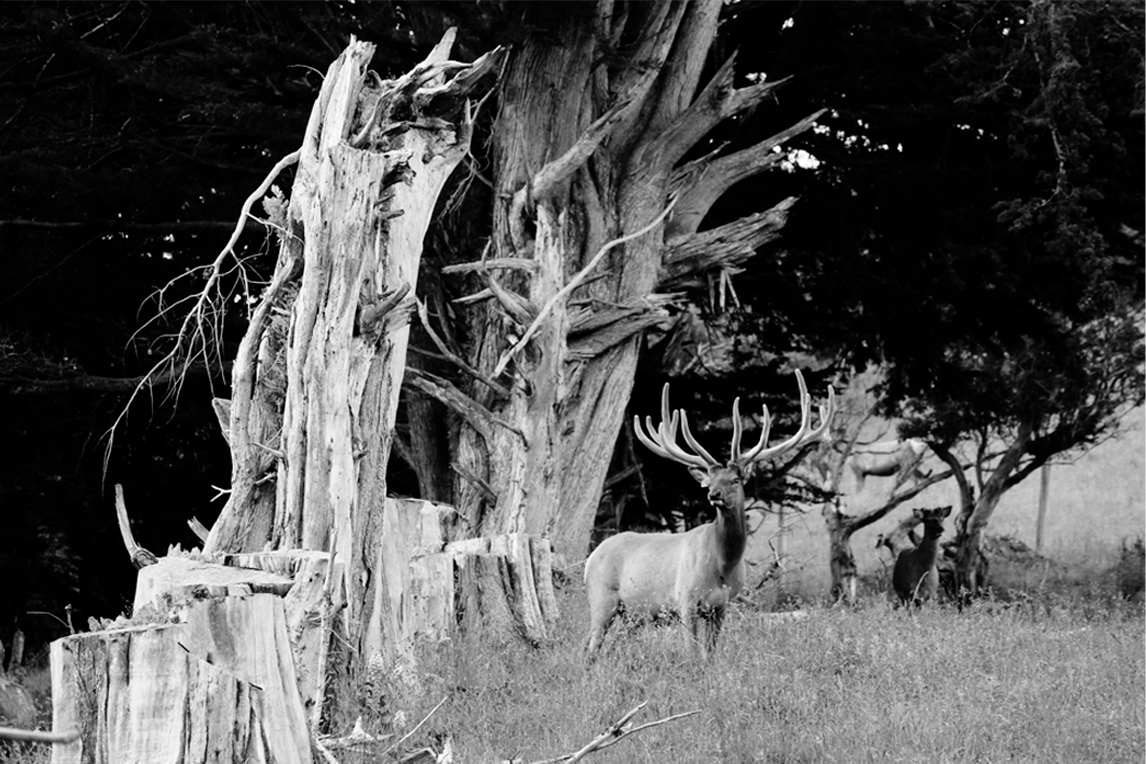Deer Industry New Zealand undertakes a range of programmes on behalf of all stakeholders in the NZ deer farming industry: farmers, processors and marketers. It is funded by levies on velvet, paid by farmers and on venison, paid equally by farmers and processors.
It does not buy or sell any deer products, but works closely with those that do. Any trade enquiries are provided directly to relevant processors or exporters. The head office is in Wellington.
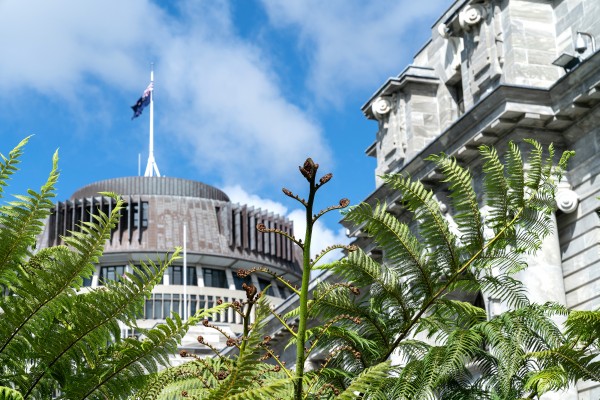
Deer Industry New Zealand’s mission is to promote and assist the development of a strong, stable, profitable industry for all participants.
To achieve this, we need to ensure that politicians, officials, other industry organisations and NGOs understand that:
- The deer industry is committed to ‘doing the right thing’ by its people, animals and the environment.
- As a responsible industry that makes a significant contribution to the NZ economy, our legitimate interests need to be provided for by government, regional councils and other agencies.
DINZ also needs to ensure that:
- Businesses and professionals servicing agriculture and the wider primary sector have an understanding of the deer industry, its products and their markets.
- Sheep and cattle farmers are aware that deer can be a lucrative addition to their livestock mix and spread their market risk.
Awareness building
Members of Parliament
DINZ informs parliamentarians and government ministers about the deer industry in the following ways:
- Farm visits and briefings for primary industry caucus committee members from the major political parties
- Invitations to ministers and opposition spokespeople to meet with the DINZ board and to attend social gatherings coinciding with industry meetings in Wellington
- A breakfast briefing for MPs and other influencers during the annual Deer Industry Conference
- Including relevant MPs on the circulation lists of Deer Industry News and DINZ eNews.
Other agencies
The DINZ QA manager maintains a close relationship with government animal welfare officials and professional staff at the RSPCA.
The DINZ environmental stewardship manager organises field days at deer farms for regional council environmental officers and auditors, so they understand environmental management on a deer farm.
Kindred organisations
DINZ and Beef+Lamb NZ have adjacent offices in Wellington, so there is constant personal engagement between staff of the two organisations. Where an issue emerges that is of concern to other primary sector groups we are often represented on cross-sector action groups. .
Farm professionals
DINZ, through the P2P programme, runs 4-5 regional workshops a year for rural professionals, to bring them up to speed with the deer difference: biology, management, profitability drivers, products and markets.
These are targeted at farm accountants and consultants, rural bankers, stock agents and others servicing deer farms in a professional role. They are very well supported, with workshops often over-subscribed.
To read more about the P2P Programme, click here >>
Sheep and beef farmers
DINZ media releases enjoy wide coverage in the wider farming media (newpapers, radio, TV and social media). This is reflected in independent survey data showing generally high and positive levels of awareness of the deer industry among beef, sheep and dairy farmers.
Policy advocacy
DINZ monitors proposals for new and amended legislation, trade agreements, regulations and regional plans. Where these are likely to affect the interests of deer farmers, product processors and marketers, we consider advocating on their behalf.
Normally, DINZ discusses the issue with the executive committee of the NZ Deer Farmers Association and/or processors and marketers to get their views. At times we will advocate jointly or, where appropriate, separately. The advocacy can take many forms, from face-to-face meetings with politicians and officials, through to formal submissions to parliamentary select committees or to regional council plan change hearings.
Because we are a relatively small industry with limited resources, our advocacy is normally limited to deer-specific issues. On issues that affect all drystock farming industries or primary industry in general, we often support the submissions of kindred organisations such as Beef+Lamb NZ. Climate change and biodiversity protection legislation are examples of this.
A major focus of our industry-specific advocacy in recent years has been legislation and regional plan changes driven by public concerns about water quality. This is because some aspects of deer behaviour (such as wallowing and fence-pacing) are unique to deer. Also many deer farms are low-intensity high country operations with little environmental impact. These factors need to be taken into account when drafting legislation, regulations and rules to ensure they are practical to implement, cost-effective and achieve their intended purpose.
Representation
The deer industry is represented on the following organisations:
- Pastoral Sector Group (methane emissions)
- National Velvetting Standards Body (NVSB)
- OSPRI
Thrive 2035 - New Zealand Deer Industry Strategy
View the strategy here >>
We are focused on creating a confident and growing deer industry that is fit for purpose, strong, and healthy. The future is ripe with opportunities, and we are reshaping ourselves to bolster and generate value for our community, land, animals, partners, and consumers.
Our vision is that our land, people, and consumers thrive. To achieve this, DINZ has identified key areas of opportunity to accelerate industry activity over the next five years:
Our Community
We strive to make the places we live in better for the future and place the industry as the most trusted agri-food users of land in Aotearoa, New Zealand.
Our Land, Animals, and People
We seek to reward our people and our land with a sustainable future.
Our Value Chain Partners
We aim to motivate our value chain partners through equitable returns and developing consumer products that create more value and are shared confidently with farmers.
Our Consumers
New Zealand-farmed venison is genuinely a cut above, and our velvet is highly prized worldwide for its rare and therapeutic properties. We make every effort to provide our consumers with high-quality and exceptional food and products that contribute to consumer well-being.
Strategic focus
Our strategic focus is on five key areas that affect the profitable farming of deer in New Zealand.
- Policy and government relations – Ensuring the deer industry has a strong united voice
- Market access and development – Increase demand for New Zealand deer products
- Industry practice and capability – We aspire to leading edge practices for deer farming
- Research and insights – Keep the industry well-informed and evidence-led
- NZDFA executive support and partnering – Working together to benefit deer farmers
DINZ is leading five work streams of critical importance to the deer industry. These are:
- Venison and co-products – New market channels: creating market diversification to achieve higher, more stable venison prices for farmers
- Velvet health products – Expanding the use of deer velvet in health food products in new market channels to keep demand ahead of production
- Animal welfare/velvet removal – Ensure New Zealand farming practises place the highest priority on good welfare outcomes for production animals
- Research programme review – In 2023, we reviewed the research commissioning processes to ensure the industry investment results in providing the answers and the capability the Deer Industry needs
- Community engagement – Bringing farmers together with their communities to ensure mutual understanding of how deer farmers meet social expectations for land and environmental management
DINZ will be monitoring progress in the following areas to track how the industry is working towards a better future.
- Our people on the land: Momentum to increase the number of farmed deer and the land for deer farming (15% - 30%)
- Contribution to vibrant communities: Sustainable success for our farmers and processors fostering vibrant communities through increased employment, economic activity, and successful farming enterprises that provide food for restaurants, schools, and local groups.
- The success of processors: Enhancing output value, boosting processor returns, and minimising price volatility through customer relationships, channel roles, storytelling, and product innovation.
- The success of farmers: Confidence in herd growth through effective engagement, collaboration, improved production and emission efficiency, and increased return per kilogram of deer farming output.
- Guardians - give back to the environment: Systematically enhance genetics, farm practices, soil and water quality, and biodiversity. Ensure land is dedicated to protecting and enhancing the environment.
- The deer on the land: Sustainably improve the pasture to emission efficiency of a growing deer herd (increase food and nutrition outputs) with fewer emissions.
- Care for our farm animals: Comprehensive deer care throughout their life, including veterinary care, shed handling, velvet harvest, and livestock transportation.
- Contribution to innovation and knowledge: Industry investment in innovation breakthroughs, securing partner knowledge, and promoting the adoption of new ideas and scientific outputs to support deer farming and product development.
- Health and well-being of consumers: Sharing more quality experiences and nutritional benefits with our customers.
The next five years present an opportunity for the New Zealand deer industry to reshape itself for this changing world. DINZ’s strategy outlines a clear path for the industry to push forward and thrive with passion.
DINZ’s role is to be the ‘glue’ in the deer industry. We want to hear from our members of the deer farming whānau — Contact us over email at info@deernz.org or over the phone at 04 473 4500.
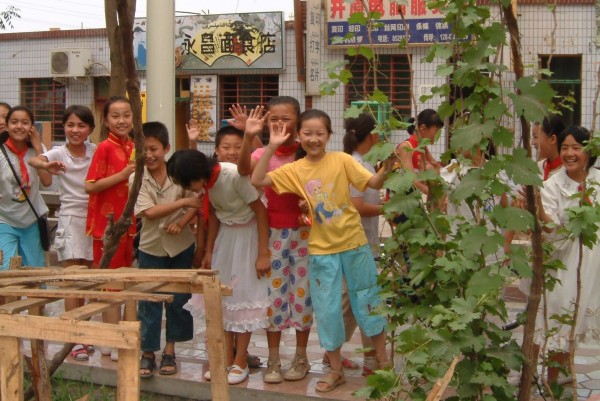
Access to international markets is critically important
Because most NZ deer products are exported, it is critical for the industry to have free access – or at least minimal barriers – to overseas markets.
Many countries have border tariffs, quotas or a combination of the two applying to deer product imports. These reduce the prices received by NZ producers, increase the prices paid by overseas consumers and limit our ability to develop markets.
In addition, every country has food hygiene and biosecurity regulations designed to protect their consumers, livestock, wildlife and the environment. Our major Asian markets for velvet and co-products have tightened these regulations in recent years.
DINZ works closely with NZ Trade & Enterprise (NZTE) and MPI officials to ensure deer products meet overseas regulatory requirements. We also work with MPI and the Ministry of Foreign Affairs and Trade, to support them in their negotiations to reduce trade barriers.
Trade barriers
We have made good progress in reducing trade barriers facing velvet exports to key markets in Asia. Barriers to the trade in venison and co-products in Asia have been more difficult to shift. Among them is a lack of legal recognition of these products in a number of Southeast Asian markets including Vietnam and the Philippines.
South Korea: In 2015, NZ officials – in liaison with DINZ – negotiated the elimination of the 20 per cent tariff on processed velvet over 15 years, as part of the NZ-South Korea Free Trade Agreement.
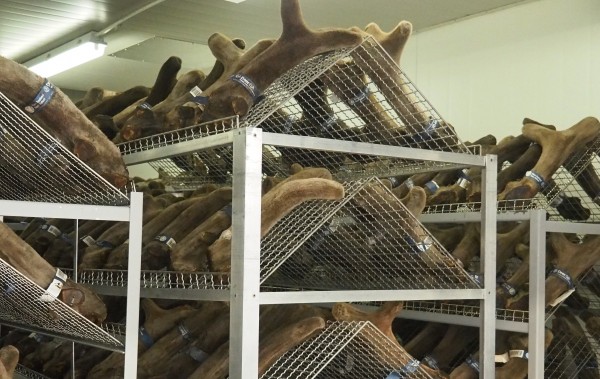
Velvet in a cold-air dryer at a Christchurch processing plant. NZ has negotiated a lower tariff for dried velvet imports into South Korea than its competitors
Although the annual 1.33% reduction in the tariff level was small, it adds up. On 1 January 2021, the tariff payable for processed NZ velvet had reduced to 10.6% -- the only country with this rate – and with free access from 1 January 2029.
South Korea retains a long-standing 20% tariff on imports of frozen velvet.
Taiwan: Under the 2013 NZ-Taiwan trade agreement (ANZTEC) duties on dry and powdered velvet products were phased out over four years. Although access to Taiwan remains restricted for frozen velvet by strict quotas, ANZTEC provides a unique country-specific quota for NZ frozen velvet.
In 2025, tariffs and quotas on dried and frozen velvet will be phased out. This will have been a long wait, but it will finally allow NZ marketers to build demand in a market that is considered to have a great potential.
Regulatory
In 2017, MPI – in consultation with DINZ – developed a Regulated Control Scheme (RCS) for velvet to ensure NZ farm raised velvet meet NZ and overseas regulatory requirements. The scheme demonstrates that all velvet is removed and handled in clean facilities, stored at temperatures that protect it from spoiling, and is free from residues. By the 2019/20 season, all registered velvet facilities complied with the scheme.
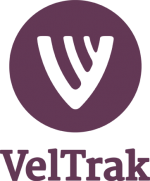
At the same time as it was rolling-out the RCS, DINZ was investing in an improved track-and-trace scheme for velvet.
Overseas regulators and MPI defined what standards they wanted the industry to meet, but it was up to the industry to work out the ‘how’.
Launched as VelTrakTM in the 2021/22 velvet season, it meets the requirements of MPI and overseas regulators for rapid and accurate tracking and tracing of food products from animals. Improved traceability has also been welcomed by our big food and pharmaceutical customers overseas.
It is a credit to all in the industry that, by working closely with farmers, vets and officials, we have come up with a unique solution. VelTrak puts the finishing touches to the RCS and ensures our velvet meets the exacting requirements of our trading partners.
Mission, vision and strategy >>
Legislation
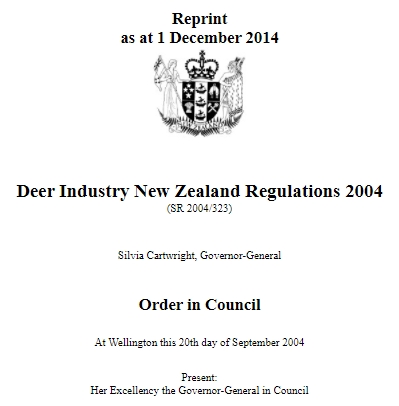
Deer Industry New Zealand is a statutory marketing authority established in 2004 with its own regulations under the Primary Produce Marketing Act 1953. It replaced the Game Industry Board which was established by the Game Industry Board Regulations 1985.
The principal functions of DINZ are:
- to promote and assist the development of the deer industry in New Zealand;
- to assist in the organisation and development of the marketing of products derived from deer;
- to maintain statistics and disseminate relevant information to members of the deer industry;
- to undertake, and arrange to be undertaken, research into deer and into processing methods for slaughtered deer;
- to account to levy payers on DINZ's activities and its use of levy money and other resources.
‘Deer’ are defined as ‘deer farmed or raised in New Zealand’. DINZ does not represent the interests of trophy parks, game estates or deer hunters.
DINZ may not acquire deer or products derived from deer except for promotional, experimental, or developmental purposes.
The DINZ board
Membership
The DINZ board is made up of eight directors elected or appointed as follows:
- 4 directors appointed by the NZDFA. Under the association’s rules this is a formal Electoral College selection process run by the NZDFA’s Selection and Appointments Panel.
- 3 directors elected by venison marketers and venison processors.
- 1 director elected by deer products marketers, deer products processors, velvet marketers, velvet pool operators, and velvet processors.
A director normally holds office for three years, ending on 30 June in the third year of their appointment. They may choose to stand for a further term or terms.
The chairperson and deputy chair are elected by the directors each calendar year.
Meetings
The DINZ board usually meets formally five times a year at roughly two-monthly intervals.
Meetings alternate between the DINZ offices in Wellington and the key deer farming regions. On the evenings before regional meetings board members meet with levy payers and NZDFA office holders to discuss industry issues. In addition the board meets during the annual industry conference in May and members often attend the NZDFA Branch chairs conference.
The board makes decisions on a consensus basis, taking into account its regulations and agreed industry strategies.
Mission and strategy
Mission
To promote and assist the development of the NZ deer industry as a strong, stable, profitable industry for all participants.
Strategy
DINZ 2019-2025 strategy:
- Premium positioning of NZ deer products
- Market diversification
- Sustainable profitable farming
- Cohesive and respected industry
Priorities:
- Building buyer preference for our products in traditional markets, at the same time as we develop new markets that want year-round supply and pay premium prices.
- Increasing deer farming productivity to match increases in other livestock industries. Providing deer farmers and their staff with the knowledge, confidence and motivation to do this.
- Catering for the deer difference in animal health and welfare, research and genetics, environmental standards, training and much else.
- Enabling better environmental stewardship.
- Optimising resource use and reducing greenhouse gas emissions from commercial activity.
To read more, see Path to 2025.
Levy funding
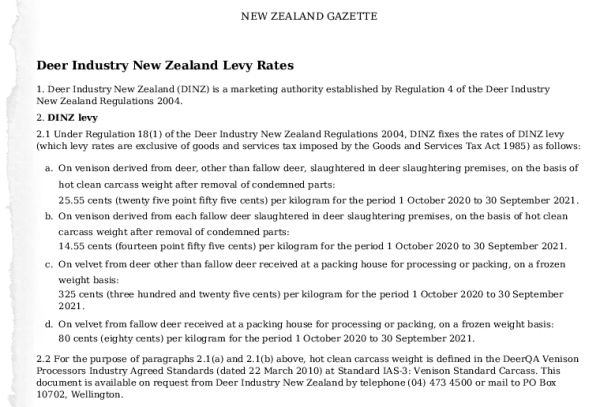
An extract from the NZ Gazette notice, dated 17 September 2020, authorising the payment of levies on venison and velvet
DINZ is funded by compulsory levies on venison and velvet. In addition, it collects a levy on venison to fund the deer industry’s share of the costs of the ‘control and eradication of bovine tuberculosis or other animal health purposes’.
Before 1 October each year DINZ is required to fix the levy rates for the forthcoming year. Usually the rates are maintained between years, but if an increase is required, DINZ consults with levy payers. DINZ may not increase the levy rate by more than 20% without the written consent of the minister for primary industries.
The DINZ levies on fallow venison and velvet are lower than for other deer because fallow carcasses and velvet are much lower in value than those from red and elk/wapiti.
The DINZ and NAIT levies on venison are paid 50:50 by the farmer and the processor. The TB-free levy is paid by the farmer.
Venison levies for the 12 months beginning 1 October 2024:
| Deer other than fallow | |
| DINZ levy | 20.50 c/kg |
| TB-free NZ | 3.00 c/kg |
| NAIT Limited | 1.00 c/kg |
| Farmer share | 14.25 c/kg |
| Processor share | 10.25 c/kg |
| Fallow | |
| DINZ levy | 9.50 c/kg |
| TB-free NZ | 3.00 c/kg |
| NAIT Limited | 1.00 c/kg |
| Farmer share | 8.75 c/kg |
| Processor share | 4.75 c/kg |
Velvet levies for the 12 months beginning 1 October 2024:
The velvet levy is paid by the farmer.
|
Deer other than fallow |
|
| DINZ levy | 290.00 c/kg |
| TB-free NZ: | 28.00 c/kg |
| NAIT Limited | 8.00 c/kg |
| 326.00 c/kg |
| Fallow | |
| DINZ levy | 40.00 c/kg |
| TB-free NZ | 28.00 c/kg |
| NAIT Limited | 8.00 c/kg |
| 76.00 c/kg |
No levy is payable on velvet worth $15.00/kg or less. As fallow velvet is not recognised in traditional oriental medicine it is of low value and therefore in practice may not be subject to levy.
Deer Industry New Zealand promotes New Zealand venison, velvet and co-products in both New Zealand and a range of export markets. The positioning depends on the market. For example in venison's case, qualifying venison is positioned as Cervena in North America, while venison is positioned as Neuseeland Hirschfleisch in Germany, and generally as farm-raised venison in New Zealand.
Deer Industry New Zealand co-ordinates and administers industry quality assurance programmes:
- On Farm
- Processors
- Transport operators
To find out more about Quality Assurance, click here >>
The deer industry is represented on the following organisations:
- He Waka Eke Noa
- National Velvet Standards Body
- Ospri/NAIT
He Waka Eke Noa
The primary sector climate policy initiative
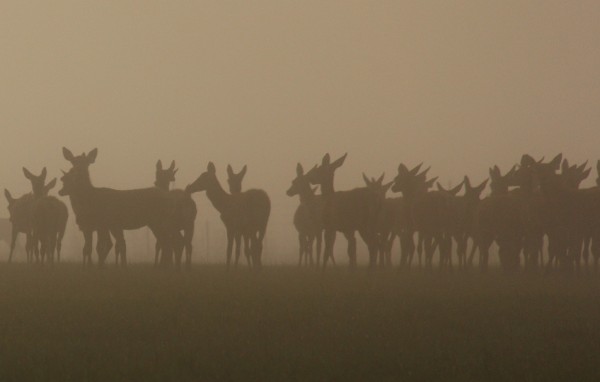
DINZ is working with all other major primary industry organisations to develop and implement a framework by 2025 to reduce agricultural greenhouse gas (GHG) emissions and build the sector’s resilience to climate change.
In the view of the DINZ board, working with the government via He Waka Eke Noa gives our industry the best opportunity to develop a framework that is practical and simple for farmers and rewards positive change.
Through the framework, farmers and growers will be empowered to measure, manage and reduce on-farm emissions; maintain or increase sequestration on farms; and adapt to a changing climate. This will include incentivising farmers and growers to take action through an appropriate pricing mechanism by 2025, in line with legislation.
DINZ does not under-estimate the difficulty of reducing carbon emissions from deer farming, which is a near-natural farming system. However, the government has a strong public mandate to act on GHG emissions from farming. Also, there is growing pressure from major global food businesses to reduce carbon emissions throughout the supply chain – from farm to the consumer.
Representative
DINZ chief executive Innes Moffat
National Velvetting Standards Body
The role of the National Velvetting Standards Body ('NVSB') is to implement the Code of Recommendations and Minimum Standards for the Welfare of Deer During the Removal of Antlers.
It runs the national velvet removal training and certification programme. This ensures that farmers wishing to velvet their own animals under veterinary supervision comply with the Code, having been trained and certified to an internationally acceptable standard.
The NVSB committee is made up of two farmer representatives nominated by deer industry levy payers and approved by the NZDFA Council; and two veterinarians nominated and approved by the New Zealand Veterinary Association ('NZVA'). Its role is recognised under regulation 58C of the Animal Welfare (Care and Procedures) Regulations 2018.
Administrative work to support the NVSB is carried out by DINZ, with funding from velvet levies and cost recovery charges paid by farmer velvetters.
For more information about the NVSB and its operations, click here >>
Representatives
Farmer rep: Paddy Boyd, Fairlie
Farmer rep: Peter Allan, Dipton
Serviced by DINZ GM - Quality Assurance Rob Gregory
Ospri/NAIT
OSPRI New Zealand Limited (OSPRI) was established by legislation in 2013. It is owned by DairyNZ, Beef+Lamb NZ and Deer Industry NZ, and is funded by levies and government investment through the Ministry for Primary Industries (MPI).
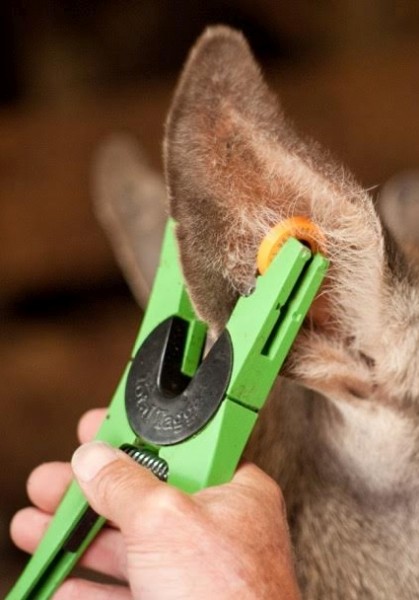 OSPRI is responsible for:
OSPRI is responsible for:
- The TB-free programme, which aims to biologically eradicate bovine tuberculosis (TB) from New Zealand by 2055, with milestone targets of livestock TB freedom by 2026 and possum TB freedom by 2040.
- The national animal identification and tracing programme, NAIT, that aims to ensure that movements of cattle and deer can be traced from birth to meat processing, in order to manage animal health, disease outbreaks, food safety and biosecurity risks.
It is important for the deer industry that these programmes are successful, both to protect the health of our deer and to give comfort to customers and regulators. We want to see TB consigned to history. We also need to be confident that, if there is a disease outbreak, or a food safety incident, affected animals can be rapidly and accurately traced and tracked.
At the same time, DINZ has an interest in ensuring that Ospri programmes are cost-efficient and that their operating rules are practical for farmers, transport operators and deer processors to apply.
DINZ has negotiated the following deer-specific changes to NAIT rules:
- Deer farmers may use various colours on their NAIT tags for the male part of the tag. Cattle tags must be all white.
- Tags on trophy stags may be removed if they deer are being sent to a game park. This can be done by the game park operator or on the farm of origin, if this is safer. NAIT needs to be informed if a tag is removed and must also be advised of the change in the animal’s location.
- Fallow deer are exempt from NAIT tagging because of the high tag loss rates for these animals. Fallow deer farmers must apply to NAIT for written permission to use this exemption. When moving fallow deer the person in charge of the animals must complete an ASD/TB form.
For information or assistance with Ospri-related matters please phone 0800 482 463 (Monday to Friday 7am - 6pm) or visit www.ospri.co.nz
Representatives
DINZ science and policy manager Emil Murphy
Deer Industry New Zealand carries out research (via research providers) on behalf of the deer industry. For example:
- Research to support international trade negotiations to open and/or maintain market access for deer products
- Production research to improve farming systems and on-farm management practices
- Product composition and efficacy research supporting the use of deer velvet as a health product
- Quality and food safety standards research programmes for venison and velvet
To find out more about research in the Deer Industry, click here >>
As explained in Policy advocacy, a major focus of our industry-specific advocacy in recent years has been legislation and regional plan changes driven by public concerns about water quality. Climate change legislation is also a major concern for the industry. Recent submissions made by DINZ or the NZDFA:
- NZDFA submission to the Climate Change Commission 31-5-2024 >>
- B+LNZ and DINZ submission to the Climate Change Commission 31-5-2024 >>
- B+LNZ and DINZ submission on the Biodiversity Credit System consultation 3-11-2023 >>
- Deferral of NZ ETS Reporting Obligations for Animals-Farmer Activities 6-9-23 >>
- NZDFA Submission on Stock Exclusion 17-7-2023 >>
- NZDFA submission on Pricing agricultural emissions 18-11-2022 >>
- Deer Industry New Zealand submission on Pricing agricultural emissions 18-11-2022 >>
- NZDFA submission on Deer Code of Welfare 4-11-2022 >>
- NZDFA He Waka Eke Noa Emissions Pricing System Options Feedback, 14-03-2022 >>
- Deer Industry NZ He Waka Eke Noa Emissions Pricing System Options Feedback >>
- Submission on He Pou a Rangi / Climate Change Commission – 2021 Draft Advice for Consultation >>
- NZDFA submission on Zero Carbon Bill, 16-07-2019 >>
- DINZ submission on Zero Carbon Bill, 16-07-2019 >>
- DINZ & NZDFA submission on Agricultural Emissions, 13-08-2019 >>
- NZDFA submission on Action for Healthy Waterways, 31-10-2019 >>
- DINZ submission on Action for Healthy Waterways, 31-10-2019 >>


